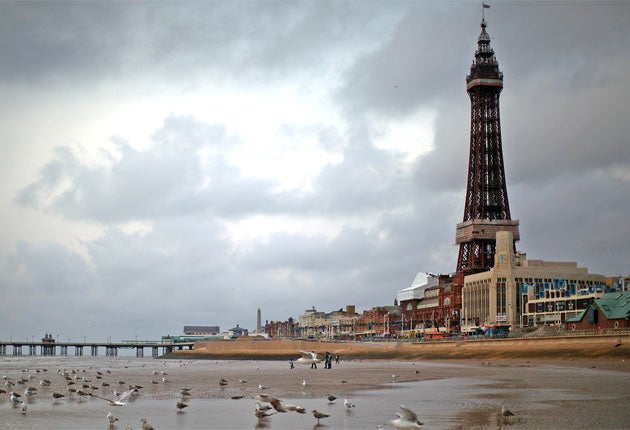Small earthquake in Blackpool, major shock for UK's energy policy
Controversial shale gas drilling halted pending investigation into possible connection with tremors

The controversial new drilling operation for natural shale gas in Lancashire has been suspended following a second earthquake in the area that may have been triggered by the process. The earthquake last Friday near Blackpool occurred at the same time that the energy company Cuadrilla Resources was injecting fluids under high pressure deep underground to deliberately blast apart the gas-bearing rock – a process known as "fracking", brought to Britain from the US, where it has been highly contentious.
Click HERE to view graphic (69k jpg)
Earthquake experts from the British Geological Survey said that the 1.5 magnitude quake last week was similar to a 2.3 earthquake in April in the same area and that both may be linked to the experimental fracking for shale gas at Preese Hall on the Fylde coast.
Bans on commercial fracking are already in place in France as well as in New York and Pennsylvania states, where people living close to fracking sites have been filmed setting fire to tap water contaminated with methane gas.
"It seems quite likely that they are related," said Brian Baptie of the British Geological Survey (BGS). "We had a couple of instruments close to the site and they show that both events were close to the site and at a shallow depth.
"The timing of these two events in conjunction with the ongoing fracking at the site suggests that they may be related." He added: "It is well-established that drilling like this can trigger small earthquakes."
The process involves pumping millions of gallons of water, mixed with rock-dissolving chemicals, into the earth to unsettle rocks and release the gas trapped there.
Cuadrilla said that it may be many weeks before it resumes fracking operations at its site near Blackpool because the incidents warrant further investigation with the help of outside experts.
"We've suspended drilling because there was an incident that the BGS recorded. We were aware of it because we have our own monitoring equipment on the site," said Paul Kelly of Cuadrilla last night.
"We are now compiling a report with the BGS and Keele University. It was entirely our decision to suspend operations. We see it as an appropriate and responsible thing to do."
Dr Baptie said: "Our analysis places the epicentre of the [latest] event to within 2km of the Preese Hall site.
"Data from two temporary instruments close to the drill site, installed after the magnitude 2.3 earthquake on 1 April, indicate that the event occurred at a depth of approximately 2km. The recorded wave forms are very similar to those from the magnitude 2.3 event [in April], which suggests that the two events share a similar location and mechanism."
Neither of the earthquakes caused any structural damage, although they could be felt by people living near by because they occurred at a relatively shallow depth, Dr Baptie said. He pointed out that the earthquakes "are pretty insignificant even by UK standards" and "they don't usually cause any damage to property".
The 2.3 magnitude earthquake in April is about 12 billion times smaller than the recent earthquake in Japan that created a huge tsunami, and is roughly equivalent to exploding about a ton of TNT deep underground, Dr Baptie said.
A report last month by the Energy and Climate Change Committee of the House of Commons found that there was no evidence that the technique of fracking was unsafe. The committee's chairman, Tim Yeo, dismissed fears as "hot air", insisting there was no danger to underground drinking supplies – which he said was the chief cause of concern amongst critics. He said there was no case for a moratorium despite growing concerns overseas.
The BGS said about the previous Blackpool earthquake: "Any process that injects pressurised water into rocks at depth will cause the rock to fracture and possibly produce earthquakes. It is well known that injection of water or other fluids during oil extraction and geothermal engineering, such as shale gas, processes can result in earthquake activity. Typically, the earthquakes are too small to be felt; however, there are a number of examples of larger earthquakes occurring."
Join our commenting forum
Join thought-provoking conversations, follow other Independent readers and see their replies
Comments
Bookmark popover
Removed from bookmarks